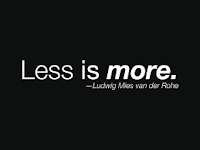This confusion happens all the time. Since the internet first crossed paths with curious, weight-loss driven people, dietitians have been hearing the same old story- although their clients know alot about nutrition, they feel lost in this sea of information. Scouring the internet for hours to find all the tips and tricks needed to guarantee weight loss and eternal health happens too often. The problem with all this so-called "research" is that it usually is accompanied by anxiety, confusion and feelings of desperation. The best solution to this information overload is to take a nutrition "research" hiatus.
This used to mean stopping the weight loss chit chat, putting down the diet book or avoiding buying the latest fitness magazine. But now, since the birth of the internet, it should also include our Twitter, Pinterest, Instagram and Facebook feeds.
Take a break from talking about food and weight loss with partners, friends and coworkers. Say au-revoir to reading the endless list of how-tos and diet guides. Unlike, unfollow and unfriend social media beings that are all about dieting/clean eating/burning calories all the time. This gives our brain a much needed break to decompress. This timeout is important for getting back to basics and to better hear our own intuition about food and eating. We have the answers to our own food questions. It takes some time and practice, but understanding hunger and fullness cues and our triggers to eat when not hungry is the simplest way to eat well.
Most people who are life-long dieters already have too much food and diet information packed in their brains so reading and talking about dieting only leads to more confusion. Talking with an expert (ie. registered dietitian) who specializes in mindful eating can do wonders for the brain, well being and anxiety related to eating. This is because sessions with a dietitian go much deeper than just conversations surrounding food and nutrition. Talking about what influences us to eat when we are not hungry as well as what fuel cravings and anxiety around food choices are the most interesting and connecting conversations we can have with professionals.

When everyone chimes in with their opinion on what we should eat or the latest miracle diet they heard about, it is stressful and does more harm than good. It often makes us second guess the best eating expert - ourselves. It is especially toxic if it is coming from our social media feed since we tend to check our feeds all day long.
Sometimes the best way friends and family and the internet can help us make lifestyle changes is to leave these conversations to the experts.












No comments:
Post a Comment